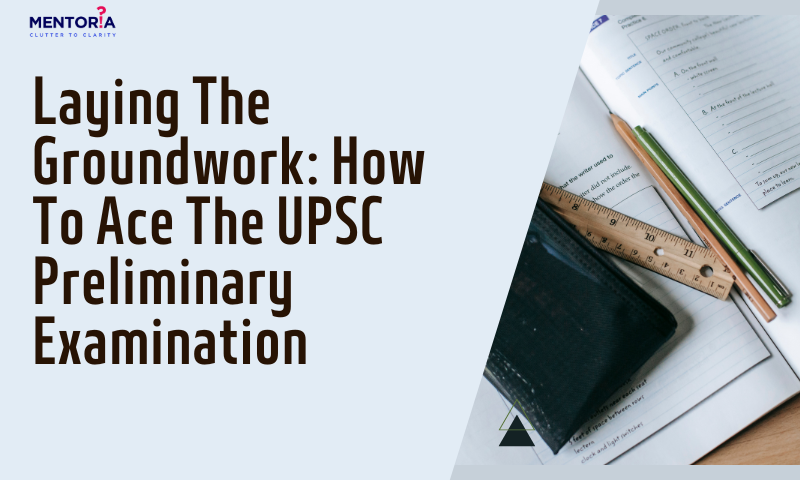Laying The Groundwork: How To Ace The UPSC Preliminary Examination

The path to success in the UPSC Civil Services Examination is paved with determination, resilience, and thorough preparation. Aspiring to serve the nation as a civil servant requires building a solid foundation right from the preliminary stage. This crucial phase demands a strategic approach, comprehensive understanding of the exam pattern, and disciplined study routine. By mastering the art of prelims preparation, candidates can effectively navigate through the vast syllabus, develop analytical thinking, and enhance their problem-solving skills. In this blog, we delve into essential tips, resources, and techniques that will equip you to build a robust groundwork for your UPSC journey.
Decoding The UPSC Prelims
The UPSC Prelims, the first phase of the Civil Services Examination, comprises two papers: General Studies (GS) Paper-I and the Civil Services Aptitude Test (CSAT) Paper-II. Let’s explore each paper in detail to understand their nuances:
- General Studies (GS) Paper-I: This paper evaluates your knowledge across various subjects, including history, geography, economics, polity, environment, science and technology, and current affairs. It is essential to comprehend the syllabus, prioritise topics based on weightage, and develop a comprehensive study plan.
- Civil Services Aptitude Test (CSAT) Paper-II: The CSAT paper focuses on testing your analytical and logical abilities. It covers comprehension, reasoning, decision-making, and problem-solving skills. Developing a strategic approach and enhancing these skills are crucial for excelling in this paper.
Selecting The Right Study Materials
Choosing the right study materials is vital for effective Prelims preparation. Here are some suggestions to curate your study material arsenal:
- NCERT Textbooks: Begin with NCERT textbooks as they provide a strong foundation and lucid explanations of core concepts. Start with the basics and gradually move to advanced books.
- Standard Reference Books: Supplement your reading with standard reference books recommended by experts and previous successful candidates. These books provide in-depth knowledge and help you gain a broader perspective on various subjects.
- Current Affairs Sources: Stay updated with the latest current affairs through newspapers, magazines, and reliable online platforms. Subscribe to a reputed national newspaper and follow specific magazines for comprehensive coverage of national and international affairs.
- Online Resources: Make effective use of online platforms offering study materials, video lectures, interactive quizzes, and discussion forums. These resources can supplement your preparation and provide additional insights.
Crafting A Study Plan
Creating a well-structured study plan is the foundation of success. Break down the vast syllabus into manageable sections and allocate specific time slots for each subject. Consider your strengths and weaknesses while planning. Establish a routine, be consistent, and avoid last-minute cramming. Remember, slow and steady wins the race!
Leveraging Smart Techniques
To make your Prelims preparation more engaging and efficient, incorporate smart techniques into your study routine:
- Flashcards and Mnemonics: Condense key facts, formulae, and concepts onto flashcards for quick revision. Create mnemonics to remember complex information easily.
- Group Discussions and Study Circles: Organise group discussions and study circles with fellow aspirants. Engage in active discussions, share insights, and clarify doubts. This collaborative approach enhances learning and provides different perspectives on various topics.
- Utilise Social Media for Learning: Join UPSC preparation groups on social media platforms like Facebook and LinkedIn. Engage in discussions, ask questions, and learn from the experiences of fellow aspirants and experts. Follow educational pages and UPSC-related handles for regular updates, tips, and inspirational content.
- Teach Others: Teaching is an effective way to reinforce your own understanding. Organise study sessions with friends or mentor junior aspirants. Explaining concepts to others not only helps solidify your knowledge but also improves your communication and presentation skills.
- Mind Maps and Diagrams: Incorporate visual learning techniques into your preparation. Utilise infographics, flowcharts, and diagrams to simplify complex concepts. Explore educational videos and online tutorials that explain topics visually, making them easier to understand and remember.
- Gamified Learning: Gamify your preparation by creating quizzes, puzzles, and trivia related to your subjects. Challenge yourself and your study group with friendly competitions. This approach not only makes learning enjoyable but also helps reinforce important information in a fun way.
Embracing Current Affairs
Current affairs play a pivotal role in the Prelims examination. Stay updated with national and international news, government policies, social and economic developments, and relevant issues. Here are some tips to master current affairs:
- Newspapers and Magazines: Develop a habit of reading a reputed national newspaper daily. Focus on the editorial section, national news, and government policies. Supplement your reading with quality magazines covering current affairs.
- Online Platforms and Apps: Utilise online platforms and mobile apps that offer curated current affairs content like Scroll.in, The Hindu, The Wire and Newslaundry. Subscribe to reliable websites, follow verified social media handles, and join Telegram groups dedicated to UPSC preparation.
- Notes and Mind Maps: Maintain concise notes of important current affairs topics, events, and statistics. Create mind maps or flowcharts to connect different aspects and establish meaningful associations.
Strengthening Analytical Skills
The CSAT paper tests your analytical and logical abilities. Here are some tips to enhance these skills:
- Read Analytical Books: Explore books specifically designed to improve analytical thinking, logical reasoning, and decision-making. Solve puzzles, riddles, and brain teasers to sharpen your mind.
- Practice Data Interpretation: Solve a variety of data interpretation problems to improve your ability to analyse and draw conclusions from data presented in various formats, such as tables, charts, and graphs. Khan Academy offers a variety of data interpretation exercises that you can practise online.
- Develop Comprehension Skills: Regularly practise reading comprehension passages and answering questions based on them. Focus on improving your speed, understanding context, and identifying key information. ComprehensionHQ is a website that offers interactive reading comprehension exercises that you can practise online.
Mastering Time Management And Exam Strategy
Time management is crucial during the Prelims examination. Develop a strategy to allocate the appropriate amount of time to each section and prioritise questions based on their difficulty level. Here are some tips:
- Solve Easier Questions First: Start with questions you find easy to gain momentum and boost confidence. This approach ensures that you answer the maximum number of questions correctly within the given time frame.
- Skip and Return: If you encounter challenging questions, don’t waste too much time on them. Instead, skip and mark them for review. Return to these questions later if time permits.
- Mock Test Simulations: Practise mock tests within a specified time limit to improve your speed and accuracy. Analyse your performance and identify areas where time management needs improvement. Some platforms where you can find mock tests for UPSC exams are BYJU’S, Unacademy, IASbaba and InsightsIAS.
Prioritising Self-Care And Stress Management
Preparing for the UPSC Prelims can be physically and mentally demanding. Taking care of your well-being is essential for optimum performance. Here are some self-care tips:
- Maintain a Healthy Lifestyle: Ensure you get enough sleep, exercise regularly, and follow a balanced diet. A healthy body supports a healthy mind.
- Practice Mindfulness and Relaxation Techniques: Engage in mindfulness exercises, meditation, and deep breathing techniques to reduce stress and improve focus.
- Pursue Hobbies and Recreation: Take breaks to pursue activities you enjoy. Engaging in hobbies and recreational activities rejuvenates your mind and promotes overall well-being.
- Seek Support: Connect with fellow aspirants, join study groups, or seek guidance from mentors and experienced candidates. Emotional support and shared experiences can boost your morale and keep you motivated.
Unlocking Success With Mentoria
You have now discovered an array of unique techniques to build a strong foundation for the UPSC Prelims. Remember, effective preparation requires a combination of hard work, strategic planning, and innovative approaches. Embrace the challenge, stay positive, and approach your studies with enthusiasm. But remember, you don’t have to navigate this journey alone. Mentoria is here to support you every step of the way. With our expert guidance, personalised study plans, and comprehensive resources, we are dedicated to helping you achieve your dream of becoming an IAS officer. Together, we will tackle the challenges, celebrate the victories, and empower you to reach new heights of success. So, let Mentoria be your trusted companion on this incredible journey towards serving the nation. Good luck and shine bright in the UPSC Prelims! With dedication and the right techniques, you are well on your way to conquering the Prelims and realising your dream of serving the nation as an IAS officer. Best of luck on your remarkable journey!









